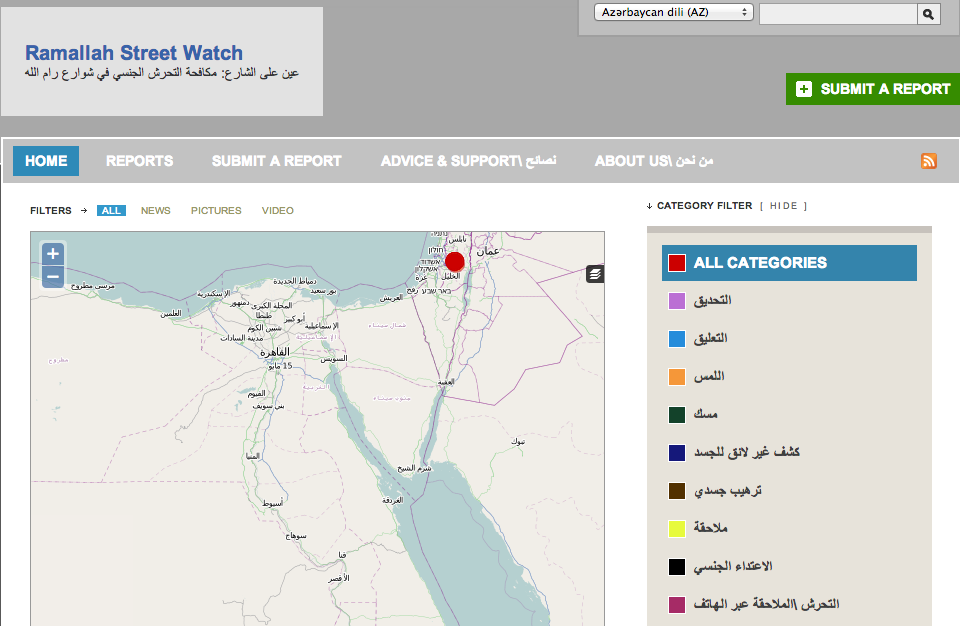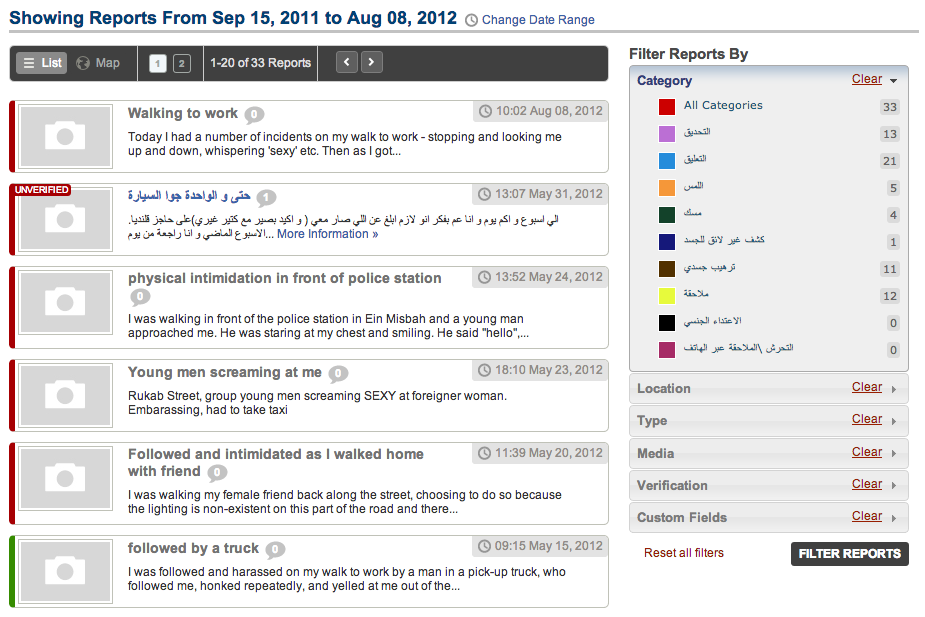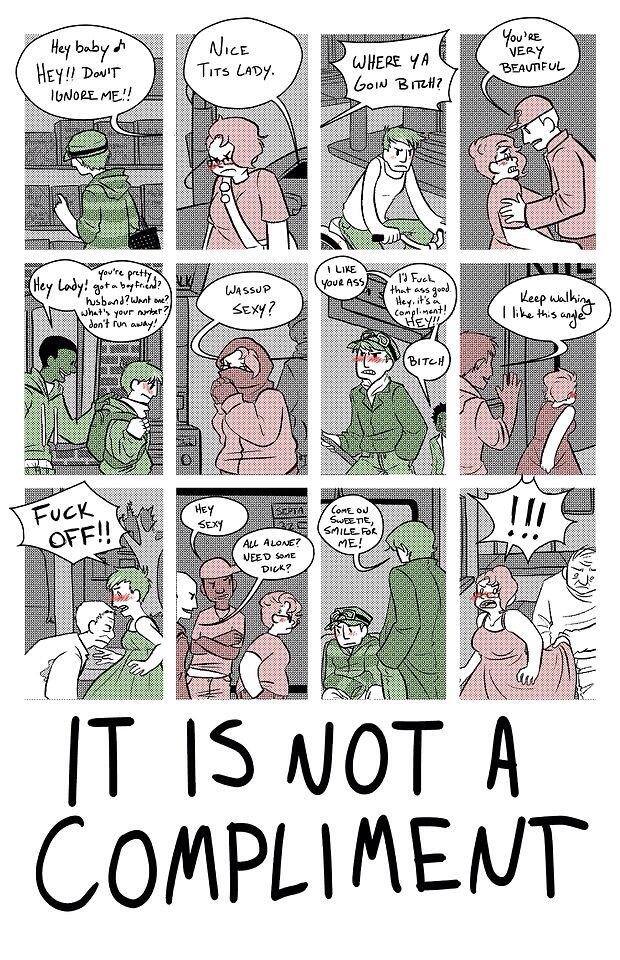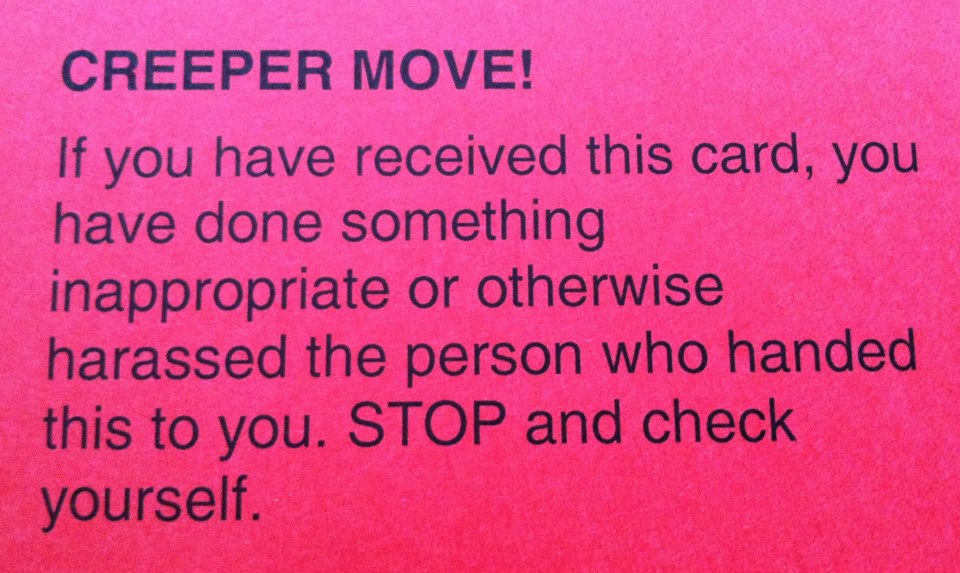In October 2011, a small group of Palestinian women started mapping sexual harassment in Ramallah through the online initiative, StreetWatch. Here one of these women and Camp participant, Dalia Othman, is interviewed by Bishakha Datta, an Indian film maker and activist. They discuss the impact and status of StreetWatch two years after it first started.
How and why did StreetWatch start?
When we started in 2011, sexual harassment was on the rise and we felt the need to do something. Over 70 people came to the first meeting, a significant number for Ramallah. With time, the group became smaller. At the end a small group of 10-12 core remained, and we brought in others to do other things.
There was no documentation around sexual harassment then. We felt an online map would be a great tool to expose this issue that everyone could sense was on the rise but no one could pinpoint. We felt a map would give it some visual form, document it, set it in stone. We created a space for women to anonymously report harassment. We figured it would show specific hot spots, specific streets, which we as women facing sexual harassment knew existed. We knew those streets. We wanted to document the streets having more harassment so that they could get more patrols. We wanted to create a support system for people being sexually harassed – so that they knew what streets to avoid, where to get support and all that.
It’s not just about having a map on the issue, it’s about doing something. So it was both documentation and support. In 2012, we created a guide for people who face sexual harassment, talked about rallying women’s organisations, talked about having the mayor’s office and the police support us in this cause.

Was it easy to build alliances with others?
Initially people were very reluctant. The mayor’s office said that StreetWatch shows Ramallah in a bad light and will be bad for tourism. However, we approached them from a woman’s perspective and asked them whether they got sexually harassed and they agreed to help. Unfortunately, shortly after our meeting the mayor resigned and elections were held that put that issue on hold.
The biggest obstacle was the police. We met with the police twice. The first time they were positive, asked us to show them the map when it goes live, and said they would support us with information and details of where women can go to report harassment. Suddenly a month after, they contact us and say they’d like to meet us. We think nothing of it. Then they say the map itself is problematic, the reports cannot be verified. We had known the reports could not be verified right from the start and say this on the site too. We told them, “Verification is your job, not ours.” Then they said that the map sheds a bad light on Ramallah, and on them. They were concerned that it would show they were not going their job. We said we can work together; we can refer people to you, but they were not interested and their tone was quite negative.

What did you do then?
We went to lawyers, went to NGOs, tried to get support. Then we realized the map was not the only way to go. I don’t know if I can blame it on the digital divide – we needed to get the word out there, but were reluctant because of the threats from the police. Although the map is still live, it no longer became the main focus of our campaign and work.
We started to take the issue to the street – coordinated with a LGBT organization, met activists who work on this issue. We planned for various campaigns, we created stickers (that read: “No to sexual harassment, the street is also ours”) that we stuck around Ramallah, especially in the downtown area. But each time we tried to put up the stickers a political or social issue would force us to postpone the campaign. Even while we were putting up the stickers there were strikes and riots regarding the increase in gas prices, but we decided to go ahead with the campaign regardless, believing that if we were to wait for other (more direct) issues to be resolved, then the issue of sexual harassment will never become the forefront of the conversation. During the campaign, and although the streets were empty, I had many interesting conversations with the men on the street about sexual harassment and what it means to them.
What were these conversations like?
Well, it was interesting how men viewed sexual harassment and how they defined it. They would say, “Women dress immodestly.” To which I would say, “Well, veiled women also get harassed.” We explained that harassment was getting worse – it was no longer just comments. A lot of men were shocked to realize that sexual assault existed and that walking down the street was no longer okay. But we explained that even looking at a woman can constitute sexual harassment sometimes. The whole concept needs to change. At one point, two young men, finally got it. “It’s us,” they said. “We need to stop doing this.”
This drove us to discuss how to deconstruct the mentality around sexual harassment through this massive campaign which included graffiti, talking at youth clubs and with college students etc. We planned to talk to shop owners: “This is what’s happening in your street, why don’t you do something about this?”

So where are things at right now?
Things have died down…StreetWatch is no longer active. It’s died down, it’s ended. It was a voluntary movement, and there were so many things that everyone was busy with. It was difficult to get a base to sustain the movement. I was working three jobs, others were doing two jobs or less – but everyone was involved with the larger political issue. We went through many processes and different stages to get to this point. Towards the end it just died down. I’ve talked to some of the volunteers, we’re thinking of doing something different without the umbrella of any group. Let’s see.
Why do you think it reached this stage?
With Palestine, you always have to look at the bigger picture and what’s going on at the same time. People were involved with the prisoners’ hunger strike, we were pushing for prisoners’ rights. Most of the activists that I saw during this year have actually been burnt out. There was so much going on in the political realm that needed a focus that our topic became sidelined. This pushed us over the edge to disband in a way.
What is your view on online and offline activism?
I’m a very strong advocate of both online and offline – there are so many tools online that can help organise or collect information that happens much faster and easier than going around with a clipboard and a pen. The online is great in trying to engage people, however at times offline engagement is needed as well to complement the online activity.
What was your biggest lesson learnt?
For any group, don’t overreach. Start with small steps. First of all, have a very clear vision of what goals you as a movement want to accomplish. As you grow, you set larger targets. Grow as a grassroots movement – volunteering is very tough, but as you grow, there will be different people who want to do different things.
Getting people organised is the curse of activist groups: we end up talking too much and not doing much.
Additional Resources:
Stop Street Harassment website
An article discussing StreetWatch in This Week in Palestine
Read more on Dalia’s blog on the creating this initiative
Interview by Bishakha Datta @busydot and Dalia Othman @daliaothman

